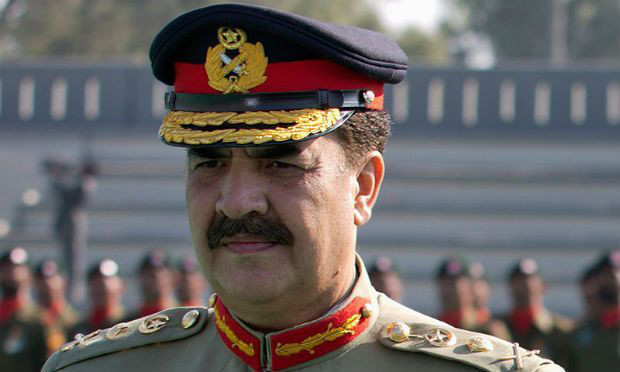
More than a year after a large-scale terrorist attack on the international airport in the southern port city of Karachi jolted the country to launch a vigorous military push against suspected Taliban sanctuaries, Pakistan appears to have begun turning the corner.
The once widely talked-about blowback, following a military campaign in north Waziristan along the Afghan border, is still waiting to happen.
Though Pakistan remains unsettled and on its guard, the country’s security managers have good reason to feel cautiously optimistic, given the advances made against Taliban strongholds. While the militants are far from finished, its safe to conclude that they are on the run.
While a number of stakeholders have contributed to bringing this outcome, the credit must go to General Raheel Sharif, the influential chief of Pakistan’s Army.
Backed by a force of more than half a million disciplined troops and the assurance of holding on to the Islamic world’s only arsenal of nuclear weapons, General Sharif has led from the front.
His repeated promises of seeing the battle to its end, until a final decisive victory over militant factions, have proven to be credible. In December 2014, Pakistanis across the board were clearly devastated, following a brutal Taliban attack on a school in the northern city of Peshawar.
Though personally stricken by a sense of grief, following that massacre which claimed at least 148 lives, Sharif quickly put in place a series of decisive measures.
These ranged from personally delivering a tough message to Afghanistan’s top leaders, demanding action against Taliban sanctuaries, to stepping up action against militants on Pakistan’s own turf.
More than six months after the Peshawar tragedy, the battle continues. But behind the scenes, Pakistan’s position has been bolstered by Sharif’s unprecedented push to bring Afghanistan’s military and civilian leaders on board.
Since the Peshawar tragedy, the top Afghan military leader was invited to preside over a prestigious military passing out parade at the Pakistan Military Academy in the northern city of Abbottabad.
This was an unprecedented and also an especially smart move, which has helped bridge the divide.
Though Afghan officials still occasionally accuse Pakistan’s intelligence services of supporting the Taliban in their war-ravaged country, such claims are making little difference to policy at the top levels in the Central Asian country.
In tandem with increased military coordination, the Pakistan army, through its intelligence assets, recently facilitated an important meeting in Islamabad between representatives of the Afghan Taliban and the Afghan government of President Ashraf Gani.
The event may conclusively break the ice between Afghanistan’s rival factions and put in place an era of relative stability in the country’s more than three decades of bloody history, going back to its 1979 invasion by the former Soviet Union.
It is an outcome that may well prove more beneficial to stabilising Afghanistan than the billions of dollars poured in to fight a US-led war, following the 9/11 terrorist attacks on America.
Stabilising Karachi
Meanwhile, within Pakistan too, General Sharif has begun overseeing decisive action. His troops operating as part of aparamilitary force in Karachi have recently begun a long awaited clean-up, targeting political groups. On Friday, the Karachi-based Muttahida Qaumi Movement (MQM) vociferously criticised the army following a raid on its offices and the arrest of two of its leaders.
The cosmopolitan city of 20 million has been for long held hostage to the whims of armed groups, including those with political clout. Stabilising the condition in Karachi by restoring law and order can well prove decisive for the future of Pakistan.
Karachi is widely known as Pakistan’s business capital and home to such important institutions as the central bank, the main stock market and headquarters of banks as well as a large number of local and foreign companies operating in Pakistan.
Karachi’s descent into chaos could cause unthinkable harm to Pakistan’s economic interests in more ways than one. In sharp contrast, the city’s successful turnaround could help stabilise Pakistan’s economic and business interests in more than just one way.
However decisive Sharif’s actions may be, questions over their long-term sustainability still remain unanswered. Eventually, the clean-up being led by the general needs to be backed by decisive political steps and formulation of the right kind of economic policies.
Tragically, this is precisely where lies the risk for the future of the gains made under Sharif’s watch. While he remains a decisive figure in retaking space once held by militants, Pakistan’s political leaders are proving to be nothing short of an outright disappointment. The parliament in Islamabad has yet to throw up a well-stitched national security policy, which can also be translated into concrete, comprehensive and decisive steps.
The other area of risk is indeed Pakistan’s economic condition. Under Prime Minister Nawaz Sharif, key areas of the economy — notably the social sector and providers of large-scale employment such as agriculture — clearly remain neglected. These areas are central to the future of Pakistan’s ability to harness the capacity of its human resources and rejuvenate the economy.
Rather than invest singularly in tackling Pakistan’s energy crisis that has knocked down output across the board, Sharif and his political compatriots are just too busy overseeing one mega project after another.
Recently, he travelled on a fancy bus — a public transport service connecting Islamabad with its sister city Rawalpindi. However, yet again, he did not have a convincing answer to a pertinent question: What about the future of Pakistanis mired in extreme poverty?
Farhan Bokhari is a Pakistan-based commentator who writes on political and economic matters.










